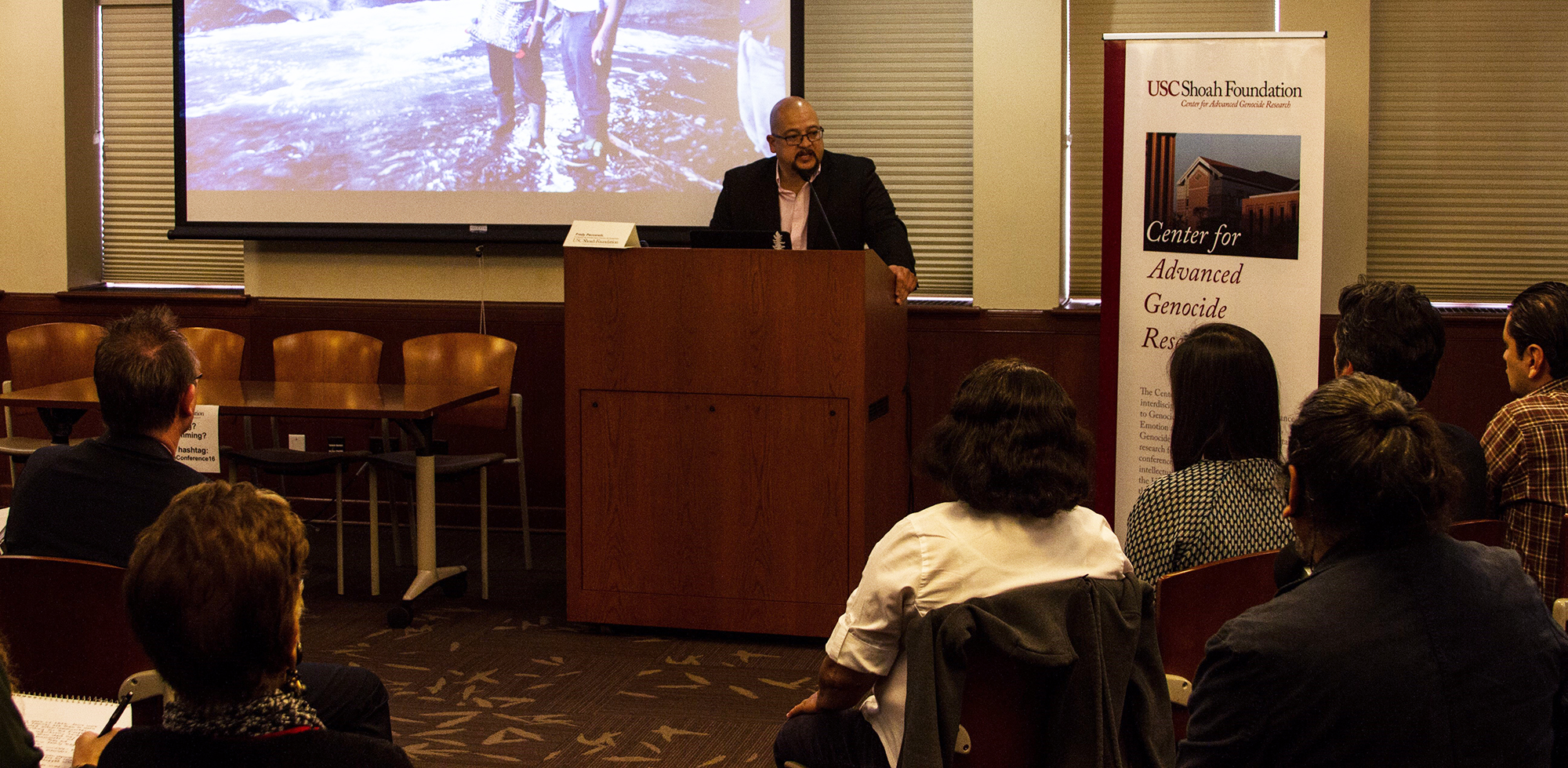Fredy Peccerelli Tells Story of FAFG’s Partnership with USC Shoah Foundation at Guatemala Conference

The conference “A ‘Conflict?’ Genocide and Resistance in Guatemala” hosted by USC Shoah Foundation Center for Advanced Genocide Research began in earnest Monday morning with a fascinating and at times heart-wrenching presentation by Fredy Peccerelli, executive director of Fundacion de Antropologia Forense de Guatemala (FAFG).
Peccerelli began his presentation by explaining how FAFG and USC Shoah Foundation first learned about each other’s work about two years ago. A delegation of USC Shoah Foundation staff visited Guatemala in order to learn about FAFG’s forensic anthropology work, in which human remains – victims of the Guatemalan genocide from over 30 years ago – are found, exhumed, identified and returned to their families.
During that visit, the Shoah Foundation staff learned about FAFG’s careful process and its dedication to its community. FAFG staff work with victims’ families every step of the way and rely on members of these communities to help them carry out their mission and tell the true story of what happened during the genocide.
However, Peccerelli said, he felt it was time for someone else to help carry the burden of these memories. FAFG had always recorded interviews with survivors and family members but had never made them available to the public. That’s where USC Shoah Foundation could come in, he thought.
“We could not carry this responsibility anymore,” Peccerelli said. “It’s not our responsibility only, but your responsibility.”
The two organizations entered into an official partnership in which FAFG staff would conduct and record testimonies of survivors in Guatemala and the testimonies would be preserved in the Visual History Archive for education and research.
USC Shoah Foundation trained FAFG staff on its interviewing methodology, which Peccerelli said was at times challenging for him and his staff to adapt to.
For example, they were used to interviewing survivors quickly, and only about the genocide. USC Shoah Foundation, on the other hand, conducts a pre-interview before the testimony even takes place, and the testimony covers the survivor’s full life before, during and after the genocide.
Although this process seemed overly thorough at first, Peccerelli said FAFG came to understand that it was important. Testimonies were better when a pre-interview had been done ahead of time – the interviewee was more comfortable with the interviewer and remembered more. Peccerelli also found that when interviewees were asked about their memories before the genocide, it was empowering for them to be able to talk about their families and happier times.
“The life before genocide is now my favorite part of the testimony,” Peccerelli said. “I’d never seen [a survivor] smile in an interview before. No one ever asked them about themselves.”
Overall, introducing testimony-taking to FAFG’s activities has created even more trust between FAFG and the families of victims in Guatemala, he said. And the new information being revealed in the testimonies is “exponentially increasing” our understanding of the massacres, torture, rape, forced disappearances and other human rights abuses that happened during the genocide.
In just a year and a half, FAFG has recorded 217 testimonies. Ten have already been added to the Visual History Archive, where they can be accessed around the world.
Peccerelli’s goal for the testimonies is threefold: to share the interviews with a wider public, to preserve them in perpetuity, and to use them to educate people about the Guatemalan genocide. Between limited funding, court cases and politics in Guatemala, the window of opportunity for taking testimonies is limited.
Because genocides and human rights violations continue to happen around the world, Peccerelli feels a sense of urgency to continue to tell the story of the Guatemalan genocide.
“We have to do as much as we can now,” Peccerelli said. “We say ‘Never again,’ but that doesn’t mean we shouldn’t try and show people that this should not be happening again and again and again.”
Watch an interview with Peccerelli immediately following his presentation on Monday: